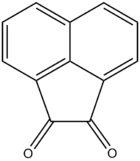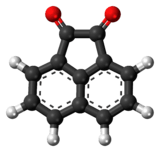Acenaphthoquinone
 | |
 | |
| Names | |
|---|---|
| Preferred IUPAC name
Acenaphthylene-1,2-dione | |
| Other names
Acenaphthoquinone (no longer accepted even in general nomenclature[1]) Acenaphthenequinone 1,2-Acenaphthenequinone Acenaphthenedione 1,2-Acenaphthylenedione Acenaphthene-1,2-dione 1,2-Diketoacenaphthene | |
| Identifiers | |
3D model (JSmol) |
|
| ChEBI | |
| ChEMBL | |
| ChemSpider | |
| ECHA InfoCard | 100.001.311 |
| EC Number | 201-441-3 |
| KEGG | |
PubChem CID |
|
| |
| |
| Properties | |
| C12H6O2 | |
| Molar mass | 182.18 g·mol−1 |
| Appearance | Purple-yellow crystals to brown powder |
| Melting point | 257 to 261 °C (495 to 502 °F; 530 to 534 K) |
| Insoluble (90.1 mg/l) | |
| Hazards | |
| Main hazards | Irritating |
| R-phrases (outdated) | R36/37/38 |
| S-phrases (outdated) | S26, S37/39 |
| NFPA 704 | |
Except where otherwise noted, data are given for materials in their standard state (at 25 °C [77 °F], 100 kPa). | |
| Infobox references | |
Acenaphthoquinone is a quinone derived from acenaphthene. It is insoluble in water, but soluble in alcohol. It is used as an intermediate for the manufacturing of dyes, pharmaceuticals and pesticides. It is also used in chemical research as a drug and therapeutic agent.
The substance is classified as an irritant. Its carcinogenic properties have not been fully investigated yet.
References
- ↑ Nomenclature of Organic Chemistry : IUPAC Recommendations and Preferred Names 2013 (Blue Book). Cambridge: The Royal Society of Chemistry. 2014. p. 724. doi:10.1039/9781849733069-FP001. ISBN 978-0-85404-182-4.
External links
This article is issued from
Wikipedia.
The text is licensed under Creative Commons - Attribution - Sharealike.
Additional terms may apply for the media files.
